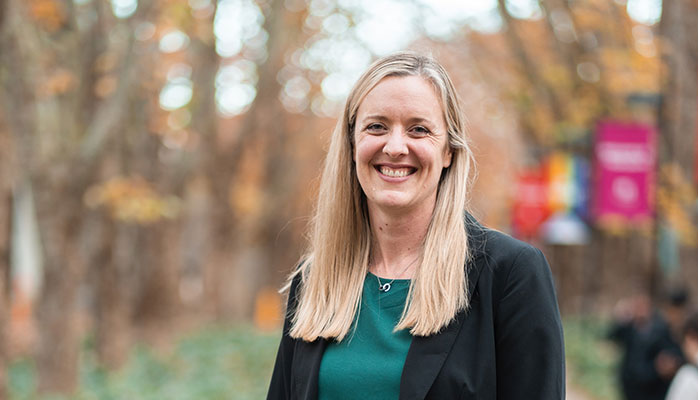Many of the significant life changes older people experience are common triggers for depression and anxiety, including health problems, bereavement and transitions to retirement, caring roles or aged care.

Despite this, both conditions are under-diagnosed in older people, with their symptoms often labelled a ‘natural’ part of ageing.
Cognitive behavioural therapy (CBT) is the gold standard treatment for anxiety and depression in all age groups, and even though it has been shown to be effective for people aged over 65, it is prescribed far less often than in younger adults.
A new study has revisited people 10 years after they took part in one of two programs designed for late-life depression and anxiety: Macquarie University’s Ageing Wisely CBT program and a discussion group focusing on social support and mental stimulation.
While both had previously been shown to be effective in the short term, there was no data about whether their benefits could also be long lasting.
The results showed that 10 years later, the CBT group had significantly lower rates of anxiety and depressive disorders compared to the discussion group.
Macquarie University Associate Professor of Psychology and lead author of the paper, Carly Johnco, says the results were remarkable.
“The people in the CBT group came to us with an average of four anxiety and/or depression disorders, but 10 years after treatment, 58 per cent were in remission from all of their disorders compared to 27 per cent of the discussion group,” she says.
“Eighty-eight per cent of the CBT group were in remission from all depressive disorders, compared to 54 per cent of the discussion group, and 63 per cent of the CBT group were in remission from all anxiety disorders, compared to 35 per cent of the discussion group.
“When it came to their primary disorder – the one that was causing them the most distress and that they sought treatment for in the first place – almost 70 per cent of the CBT group were in remission compared to 42 per cent of the discussion group.”
Another important measure of effectiveness was how many people in each group had relapsed since their original treatment.

Misconceptions: Associate Professor Carly Johnco, pictured above, says anxiety and depression are not a normal part of aging.
Just one third of the CBT group went on to experience symptoms in any of their disorders after the completion of their program.
In contrast, between 50 and 80 per cent of the participants in the discussion group had symptoms return on at least one occasion.
Why skills beat support
Ageing Wisely teaches participants skills including how to manage worries and unhelpful ways of thinking, develop different ways of solving problems, how to overcome stressful situations by facing fears, and more adaptive ways of communicating, such as how to be more assertive.
It also teaches them how to monitor their symptoms of depression and/or anxiety, and use the skills they have learned to manage them over time.
This new study shows that not only can we teach older people new tricks, but that those new tricks will remain beneficial for many years to come and help people through tough times.
Associate Professor Johnco says even though the discussion group was focused on social support, peer connection, and mental stimulation, it did not appear to be of as much benefit to the participants in the long term.
“For transitions and changes, they needed to have skills to be able to manage those situations themselves rather than just relying on other people to always provide that support,” she says.
“In the time since they had received treatment, we’ve been through the COVID-19 pandemic, and many of the people in both groups had experienced significant new stressors in their lives over the past 10 years, such as the loss of a partner or new health problems.
“Nevertheless, the CBT group was able to use what they had learned to cope without a recurrence of their symptoms.
“What people learn in Ageing Wisely is very transferrable, because they learn how to apply those skills to their depression and/or anxiety now, but they’re also encouraged to think ahead about how they might apply them to stressors in the future.”
The damaging myth of the ‘old dog’
Associate Professor Johnco says mental health problems in older people are often missed.

“It is not a normal part of ageing to become anxious and depressed,” she says.
“When older people present with mental health symptoms – if they are recognised as mental health symptoms at all – they are disproportionately prescribed medication.
“There’s a misconception that psychological treatment won’t be of assistance, not only among the individuals themselves, but also among general practitioners, allied health professionals and even psychologists.
“There’s a false belief that you can’t teach an old dog new tricks, and that’s incredibly damaging.
“This new study shows that not only can we teach older people new tricks, but that those new tricks will remain beneficial for many years to come and help people through tough times.
“It’s important that we move past the ageist stereotypes and the stigma to ensure that older people receive the help they need – because it can make a big difference.”
Ageing Wisely is available as an individual treatment program through the Macquarie University Emotional Health Clinic both in person and online. Training and accreditation are also available for clinicians who would like to provide the program to their clients.
Carly Johnco is an Associate Professor of Psychology and Clinical Psychologist in the Macquarie University School of Psychology, and Deputy Director of Research in the Macquarie University Lifespan Health and Wellbeing Research Centre.



